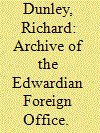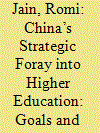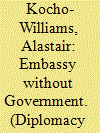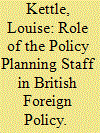|
|
|
Sort Order |
|
|
|
Items / Page
|
|
|
|
|
|
|
| Srl | Item |
| 1 |
ID:
174322


|
|
|
|
|
| Summary/Abstract |
This analysis explores the history and structure of the archive of the Edwardian Foreign Office. It uses data and quantitative research methodology to address two crucial questions. What survives within the collection? And what can historians and others find using the regular discovery tools such as indexes and catalogues? It concludes by looking at how these processes shape the ways historians are using this collection; and in doing so, it provides a crucial new context for any historians using this hugely important source and poses some challenging questions about the nature of archival research methodology.
|
|
|
|
|
|
|
|
|
|
|
|
|
|
|
|
| 2 |
ID:
174327


|
|
|
|
|
| Summary/Abstract |
As a double-edged sword, higher education has emerged for China as a fulcrum of its geo-intellect as well as a statecraft instrument. Geo-intellect connotes the expansion of a country’s frontiers of higher education and research in different geographies, which in China’s case is a subset of its global power project. As a form of statecraft, on the other hand, higher education is a channel for advancing national interests whether related to public diplomacy or specific geopolitical and geo-economic goals. South Asia is no exception to China’s outreach in the realm of higher education through which Beijing seeks to accomplish its statecraft mission. Against this background, this analysis delineates China’s explicit and implicit goals and interests in Nepal, a South Asian country, by employing the Educational Soft Power Model.
|
|
|
|
|
|
|
|
|
|
|
|
|
|
|
|
| 3 |
ID:
174324


|
|
|
|
|
| Summary/Abstract |
This analysis addresses the Council of Ambassadors, a much-neglected body that was composed of Russia’s pre-Revolutionary diplomats following the October Revolution of 1917. Centred in Paris, at the heart of the Russian émigré community, the Council of Ambassadors attempted to assert its authority as the rightful representatives of Russia and engaged with foreign governments. It also took steps to block the recognition of the Bolshevik regime and enlist support for the Whites in the Russian Civil War. Although ultimately unsuccessful, the Council of Ambassadors did continue as the representative of Russia at the Paris Peace Conference in 1919 and until the Soviets were officially recognised by other Powers in the early 1920s. The study of the Council of Ambassadors raises important questions about the fate of a diplomatic corps following a revolution, and how personal identity within the émigrés tied to their former status. It also sheds light on how other Powers chose to deal with the representatives of a Russia that had been overthrown.
|
|
|
|
|
|
|
|
|
|
|
|
|
|
|
|
| 4 |
ID:
174321


|
|
|
|
|
| Summary/Abstract |
This analysis argues that two conceptual tools – the idea of international society used by English School theorists and a concept of health derived from Thucydides’ Hippocratic analysis in The History of the Peloponnesian War – provide a powerful explanation for why Great Powers make unreasonable demands on small states and why small states choose to resist them. Two examples – the Melian refusal to accede to Athenian demands in 416 BC and the Belgian refusal to grant the German Army free passage in 1914 AD – illustrate smaller Powers choosing to resist a far superior military force. By contextualising the Melian Dialogue in a larger analysis of the Peloponnesian War, this exegesis develops the concept of “health’ and relates it with the English School concept of international society. These concepts then apply to Belgium’s security dilemma of August 1914. Germany’s military leadership assumed that Brussels would acquiesce or defend its territory only nominally; however, Belgian leadership, like the Melians, chose to resist, denying Berlin its military objectives whilst encouraging Britain to intervene.
|
|
|
|
|
|
|
|
|
|
|
|
|
|
|
|
| 5 |
ID:
174323


|
|
|
|
|
| Summary/Abstract |
The analysis examines Sweden’s attitude towards the various ideas of a Baltic – Baltic-Scandinavian – Union in the 1920s whilst paying attention to Lithuania as the most vulnerable Baltic country primarily because of the Polish-Lithuanian conflict over Vilnius. The Swedish attitude towards the Baltic States in the 1920s in general and their union in particular lay grounded largely on the Baltic States recent emergence as independent polities. Lithuania was, however, helpful to Sweden as an unofficial partner in attempts to detach Finland from the Baltic States and foster Finland’s Scandinavian orientation. Sweden’s favourable view towards the vision of a little Baltic union – Estonia, Latvia, and Lithuania – was also convenient for Lithuanian purposes. Lithuania was to receive equal treatment with Latvia and Estonia even if in the eyes of Swedish diplomats it was the weakest and most vulnerable of the three.
|
|
|
|
|
|
|
|
|
|
|
|
|
|
|
|
| 6 |
ID:
174325


|
|
|
|
|
| Summary/Abstract |
This analysis challenges the traditional approach to studying the creation of foreign policy within the Foreign and Commonwealth Office [FCO]. Whilst most historical and contemporary research has focused upon the role of the foreign secretary, permanent under-secretary, and senior overseas representatives, this exegesis argues that an overlooked department – the Policy Planning Staff and its contemporary successor, the Policy Unit – has had significant influence over the debate and direction of British foreign policy. Drawing upon documents received under the Freedom of Information Act, archival documents, and interviews conducted with current and previous members of the Staff and the wider FCO, it reveals the rationale for the planning department, its roles, structure, staffing, and influence on foreign policy over time. It concludes that the department has been, and remains, a crucial part of the policy-making process and, therefore, warrants further attention from historians and those interested in contemporary foreign policy analysis.
|
|
|
|
|
|
|
|
|
|
|
|
|
|
|
|
| 7 |
ID:
174326


|
|
|
|
|
| Summary/Abstract |
In international politics, the Holy See and the United Nations [UN] share a universal mission for peace and human rights, and some observers see the Vatican’s relationship with the international organisation as indicative of this special nature. However, the Holy See never subsumes its narrow interests to UN-espoused initiatives; indeed, it is comparable to any other Power or international organisation in its UN dealings. This analysis demonstrates this matter with two issues: Holy See-UN policy differences over the 1991 Iraq War, and the 1994 Cairo population and 1995 Beijing status of women UN conferences. Policy differences arose from Holy See interests and values that it sought to protect. During the Iraq war, it was the desire to protect Middle Eastern Christians. During the two conferences, these normative interests reflected the Church’s opposition to UN policy on abortion and socially constructed gender. Accordingly, Vatican disagreements are philosophically rooted and thus intrinsic. Therefore, like the relationships of other states with the UN, the Holy See is special and at the same time, not so special.
|
|
|
|
|
|
|
|
|
|
|
|
|
|
|
|
| 8 |
ID:
174328


|
|
|
|
|
| Summary/Abstract |
Embassy-based small grant schemes [SGS] are a niche development tool with public diplomacy objectives. SGSs create opportunities for local actors to pursue development goals whilst enabling diplomatic staff to practice a kind of street-level diplomacy, engaging segments of society outside traditional diplomatic circles. However, an argument often raised against such programmes are SGS administrative costs and the risk of misappropriation. Recognising this critique, the analysis explores the challenges and benefits of SGSs as seen by those individuals who manage these programmes at the embassy level. It also examines the experiences of SGS officials as they reflect on the diplomatic value of small grant schemes given their administrative and bureaucratic challenges. Despite challenges inherent in SGSs, diplomats and others involved perceive the benefits as worthwhile; however, results suggest that the benefits are contingent upon appropriately flexible and efficient systems, but also an officialdom capable of capitalising on the value of street-level diplomacy.
|
|
|
|
|
|
|
|
|
|
|
|
|
|
|
|
|
|
|
|
|